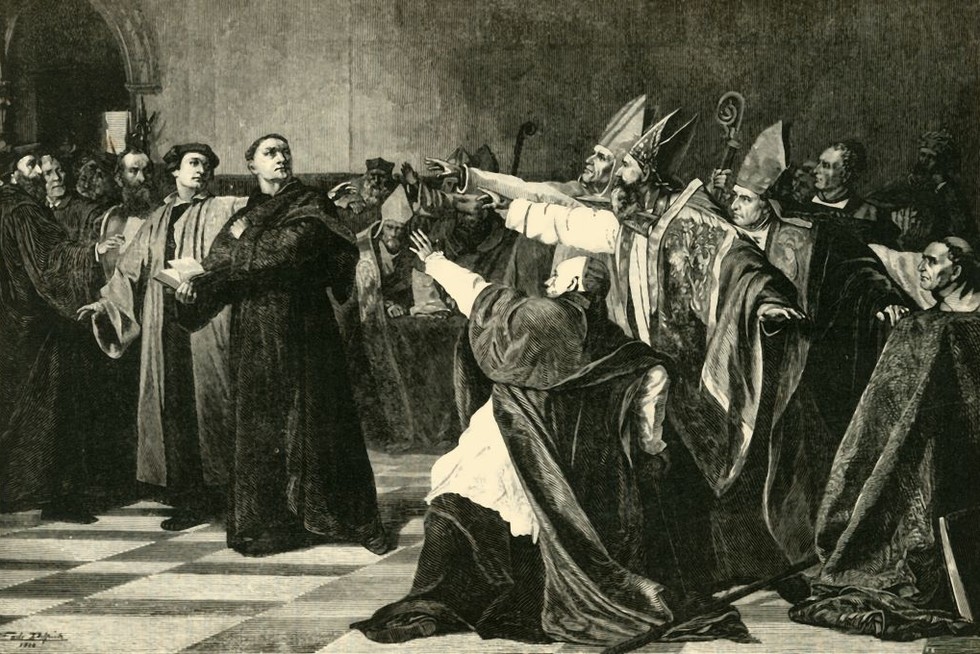
2.2 Reformation - 16 Century
The Reformation generally is recognized to have begun in 1517, when Martin Luther (1483–1546), a German monk and university professor, posted his ninety-five theses on the door of the castle church in Wittenberg. Luther argued that the church had to be reformed.
The Reformation (alternatively named the Protestant Reformation or the European Reformation) was a major movement within Western Christianity in 16th-century Europe that posed a religious and political challenge to the Catholic Church and in particular to papal authority, arising from what were perceived to be errors, abuses, and discrepancies by the Catholic Church. The Reformation was the start of Protestantism and the split of the Western Church into Protestantism and what is now the Roman Catholic Church. It is also considered to be one of the events that signified the end of the Middle Ages And the beginning of the early modern period in Europe.
Prior to Martin Luther, there were many earlier reform movements. Although the Reformation is usually considered to have started with the publication of the Ninety-five Theses by Martin Luther in 1517.
Movements had been made towards a Reformation prior to Martin Luther, so some Protestants, such as Landmark Baptists, and the tradition of the Radical Reformation prefer to credit the start of the Reformation to reformers such as Arnold of Brescia, Peter Waldo, John Wycliffe, Jan Hus, PetrChelčický, and Girolamo Savonarola
The leaders of the Roman Catholic Church condemned him at the Council of Constance (1414–1417) and he was burnt at the stake, despite a promise of safe-conduct.Wycliffe was posthumously condemned as a heretic and his corpse exhumed and burned in 1428.
The Reformation is usually dated to 31 October 1517 in Wittenberg, Saxony, when Luther sent his Ninety-Five Theses on the Power and Efficacy of Indulgences to the Archbishop of Mainz. The theses debated and criticised the Church and the papacy, but concentrated upon the selling of indulgences and doctrinal policies about purgatory, particular judgement, and the authority of the pope. He would later in the period 1517–1521 write works on devotion to Virgin Mary,
The Reformation was a triumph of literacy and the new printing press. Luther's translation of the Bible into German was a decisive moment in the spread of literacy, and stimulated as well the printing and distribution of religious books and pamphlets. From 1517 onward, religious pamphlets flooded Germany and much of Europe
All of Scandinavia ultimately adopted Lutheranism over the course of the 16th century, as the monarchs of Denmark (who also ruled Norway and Iceland) and Sweden (who also ruled Finland) converted to that faith.
Catholic Church: European countries with significant or majority Catholic populations are Andorra, Austria, Belarus (western), Belgium, Croatia, France, Germany (western and southern regions), Hungary, Republic of Ireland, Italy, Latvia (the Latgale region), Liechtenstein, Lithuania, Luxembourg, Malta, Monaco,
Protestantism: European countries or areas with significant Protestant populations are Denmark, Finland, Germany (central, eastern and northern regions), Great Britain, Iceland, Netherlands (central and northern regions), Northern Ireland, Norway, Sweden, and Switzerland (except the southern part).
The Catholic Church, also known as the Roman Catholic Church, is the largest Christian church, with 1.3 billion baptised Catholics worldwide as of 2019.
Catholicism is the largest denomination of Christianity. All Catholics are Christians, but not all Christians are Catholics. A Christian refers to a follower of Jesus Christ who may be a Catholic, Protestant, Gnostic, Mormon, Evangelical, Anglican or Orthodox, or follower of another branch of the religion.
A Catholic is a Christian who follows the Catholic religion as transmitted through the succession of Popes. The Pope is the leader of the Catholic church. The Catholic church is the largest of the Christian churches - about 60% of Christians are Catholic.
